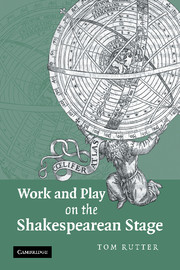Book contents
- Frontmatter
- Contents
- Acknowledgements
- Note on texts and dates
- Introduction
- Chapter 1 Work in sixteenth-century England
- Chapter 2 ‘Vpon the weke daies and worke daies at conuenient times’: acting as work in Elizabethan England
- Chapter 3 ‘Though he be a king, yet he must labour’: work and nobility in Shakespeare's histories
- Chapter 4 ‘We may shut vp our shops, and make holiday’: workers and playhouses, 1599–1601
- Chapter 5 ‘Work upon that now!’: labour and status on the stage, 1599–1610
- Conclusion
- Notes
- Bibliography
- Index
Chapter 3 - ‘Though he be a king, yet he must labour’: work and nobility in Shakespeare's histories
Published online by Cambridge University Press: 22 September 2009
- Frontmatter
- Contents
- Acknowledgements
- Note on texts and dates
- Introduction
- Chapter 1 Work in sixteenth-century England
- Chapter 2 ‘Vpon the weke daies and worke daies at conuenient times’: acting as work in Elizabethan England
- Chapter 3 ‘Though he be a king, yet he must labour’: work and nobility in Shakespeare's histories
- Chapter 4 ‘We may shut vp our shops, and make holiday’: workers and playhouses, 1599–1601
- Chapter 5 ‘Work upon that now!’: labour and status on the stage, 1599–1610
- Conclusion
- Notes
- Bibliography
- Index
Summary
In the last chapter, I argued that the relationship between acting and work changed fundamentally over the course of the sixteenth century. On the one hand, financial and doctrinal imperatives drove out of existence the amateur religious drama that had flourished in the English towns during the Middle Ages. On the other, an increase in the number of touring companies and the growth of a secular theatre industry in London meant that more and more people were gaining an income from playing. These developments, I suggest, drew actors into a wider debate about work and idleness, such that they were charged both with following an illegitimate occupation and with enticing other groups in society away from their own work. In response, theatrical depictions of actors in the public theatre of the 1590s attempted to present acting as work, whether by contrasting the performers with fictional amateur actors, by asserting the dignity of the actor's profession or by invoking the notion that public playing was, in fact, a rehearsal for appearances at Court.
The criticisms made of plays and actors, and the methods those working in the theatre used to answer them, both support the argument I put forward in Chapter 1: that in the sixteenth century, it became increasingly common for the activities of groups in society to be understood in terms of work. Actors were condemned for pursuing a mode of life that was not work; in return, their supporters presented acting as a form of legitimate labour.
- Type
- Chapter
- Information
- Work and Play on the Shakespearean Stage , pp. 55 - 86Publisher: Cambridge University PressPrint publication year: 2008



